Q&A with Mark Forscher, Chief Marketing Officer at Alluvial
We discuss Mark's perspective on branding, the similarities between web3 and New York City, and the most underappreciated features of effective leadership.
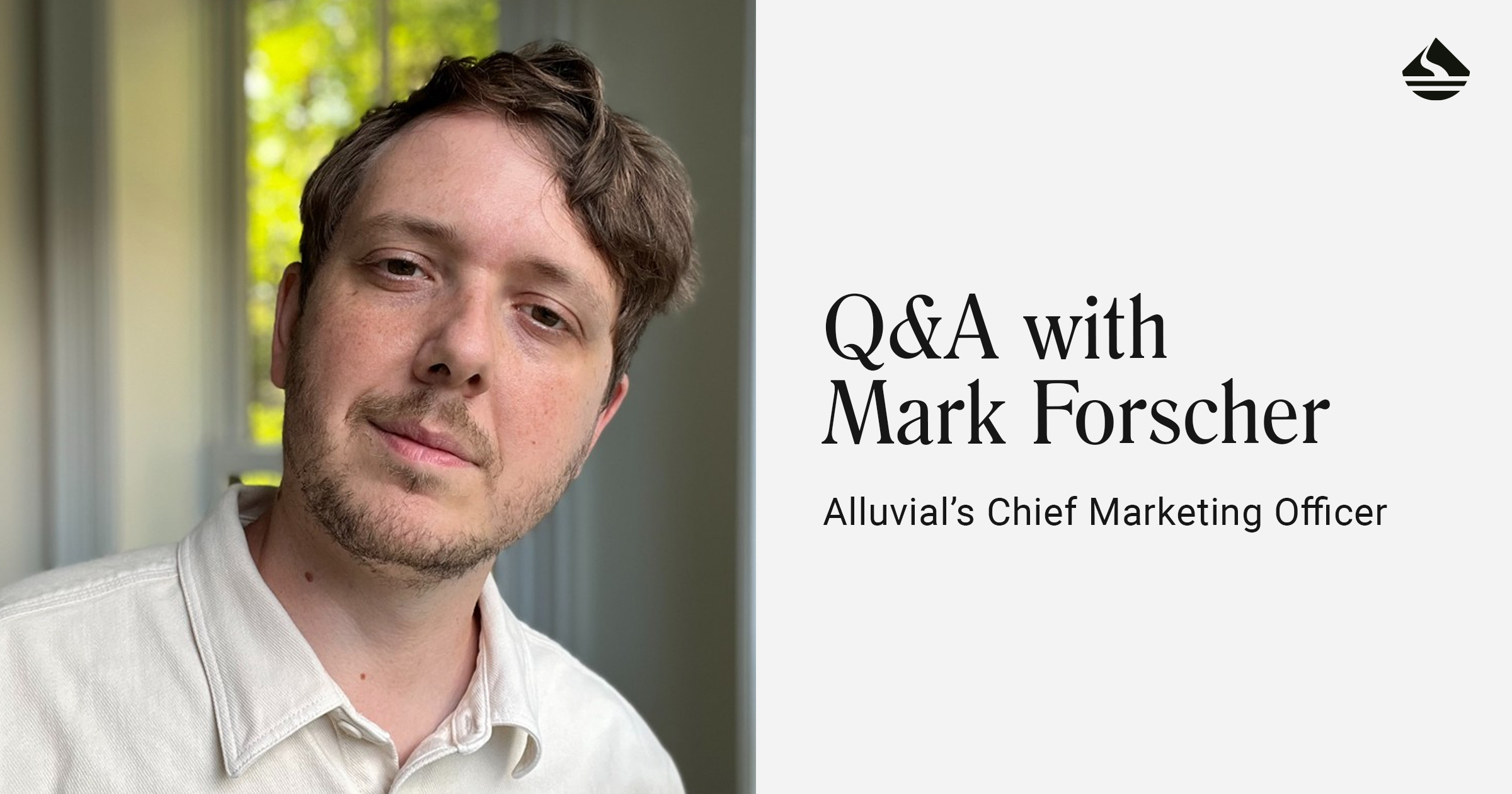
Hi, Mark! Could you tell us how you came to be CMO at Alluvial?
Hi, Melissa! I wish there was a simple answer to this. In hindsight, my career path makes sense to me, but honestly, every step led to the next without any sort of cohesive plan leading to this role at Alluvial. I just try to work on the most interesting projects I can find with good people.
About five years ago, I started working at Bison Trails, a blockchain infrastructure-as-a-service (IaaS) company that ran nodes for new proof of stake networks. My role was leading marketing and design for the New York-based startup. A few years in, we were the biggest provider in the space by assets staked, and Bison Trails was acquired by Coinbase as they expanded into infrastructure and developer products in early 2022.
The Bison “herd” migrated into Coinbase and I managed a team of amazing product designers, and UX researchers, as the Design Lead for Coinbase Cloud. A little bit later, while at Coinbase, I started advising a project inspired by VISA’s origins and backed by Figment, Kraken, and Coinbase Ventures. The project’s goal was to create a collaborative enterprise-grade liquid staking standard. That of course turned into Alluvial, the software development company, and later Liquid Collective, the decentralized protocol.
Before we had a name for either, Evan Weiss asked me to facilitate a session with Matt Leisinger and Andy Cronk from Figment, plus some folks from Coinbase and Kiln, to help the representatives from competing companies align on a name for the project we were all supporting.
Seeing direct competitors collaborate on this naming process was really interesting and demonstrated the power of value alignment. Everyone had high trust and respect for each other and we were all excited about this shared vision. After that session I never stopped working with the team. It was a good fit. This is part of the story of how I became CMO at Alluvial nearly two years ago, in August of 2022.
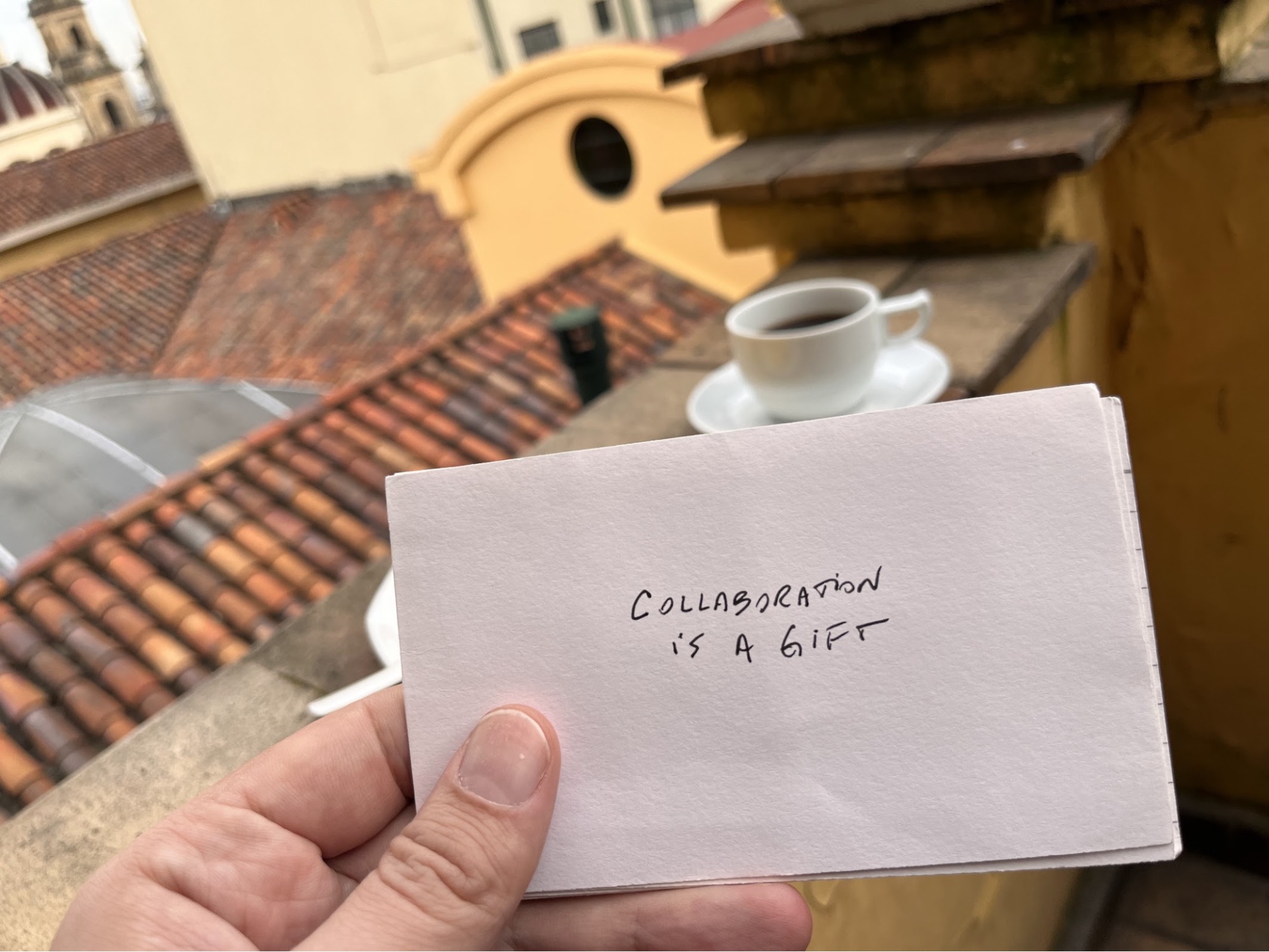
Before joining Bison Trails, what was your professional background? What are some achievements you’re most proud of?
My professional background is fairly diverse. In the aughts, I went to grad school at Parsons in NYC for Design and Technology, and I’ve lived here ever since. While I was earning my MFA, I also worked at R/GA to start paying off my massive student loans and to have real-world agency experience designing campaigns with the very talented crew of creatives and producers on the Nike Basketball account.
After Parsons, I joined a much smaller six-person agency called Code and Theory which was starting to be recognized for its innovative work. We made beautiful and unique digital products for a range of brands out of a Broadway office in SoHo. Not long after, I began to manage some of the company’s creative projects and client accounts, and I was promoted to Creative Director.
I helped grow the team, led the launch of many large-scale interactive and editorial projects like Big Think, and partnered closely with the agency’s founders—Dan Gardner and Brandon Ralph—to build our reputation of excellence and the creative, client, and project management processes that enabled the business to scale effectively. While I was Creative Director, we doubled revenue year over year and grew the team to 30 people.
I then “went client-side” and was hired as Creative Director at Newsweek in NYC. I remember learning a lot about the standards and practice of journalism by collaborating with editors, art directors, product folks, and reporters during the 2008 U.S. presidential election. After Newsweek, I worked as Creative Director at ABC News on the digital team, during the rise of what we now call web2, when Facebook was completely upending the business models of these behemoth media brands.
After a few years in creative leadership roles in traditional media companies, and watching web2 tech companies transform the media landscape, I realized I actually didn’t want to work in media at all: I missed brand work and spending time with scrappier technology innovators and entrepreneurs.
So I started an independent creative studio called Under After, focused on branding, strategy, and design for early-stage founders in NYC. A few highlights from over ten years at Under After: I created the brand identity for Rubicon, now a public company that provides software solutions in the recycling and waste industry—they’re still using the same logo I designed in 2015. I named and created the original visual identity for Aura, a gesture-controlled digital picture frame selected as one of Oprah’s Favorite Things. I supported the launch of Data & Society, a research institute in NYC. And I worked with many more startups that never found traction.
Collaborating with these founders, often in more technical spaces, to help realize their vision was very motivating. The project that officially ended my studio’s decade-long run in NYC, was working with Joe Lallouz and Aaron Henshaw on the launch of their company called Bison Trails.
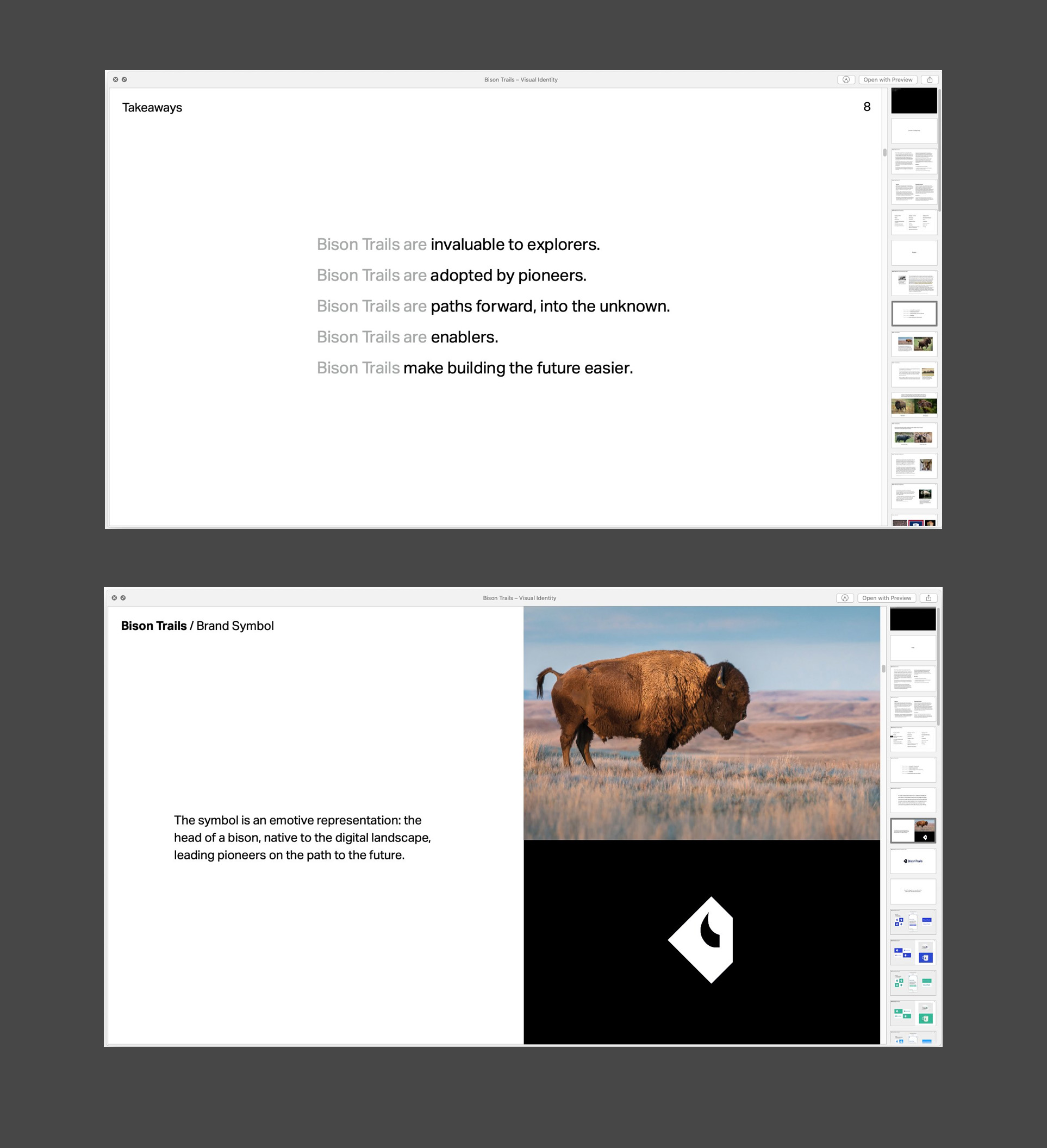
In late 2018, Joe contacted me to create the visual identity for Bison Trails and I got hooked on Joe and Aaron’s vision of providing an easy way to participate in blockchain networks securely. I quickly wrapped up other client projects, shuttered Under After, and joined the Bison Trails leadership team in early 2019 to run marketing and design.
Collaborating with and learning from Joe and Aaron, brilliant minds like Viktor Bunin and Elias Simos—both protocol specialists at the time—engineering leaders like Rob Christensen, and the amazing and unstoppable crew I hired including Melissa Nelson, Casson Rosenblatt, Sangita Shah, and Erin Nolan was a dream job. Bison Trails is where I also first connected with Evan Weiss and Mara Schmiedt!
A specific moment I remember clearly was when Serena’s husband Alexis Ohanian—who was also an investor—wore some apparel I designed for Bison Trails to the French Open, and the photo was widely circulated. I think of that as the beginning of the brand amplifying through apparel era of my career. In hindsight, that time with the herd and the brand we all built together was really unique.
Why crypto? What sparked your interest in web3, and what keeps you around?
I like working in crypto for many reasons that are related to the intersection of culture and technology. The technology itself requires true collaboration and coordination for it to be viable at scale. There aren’t many industries in which teams are furiously innovating in highly competitive areas, while also supporting open standards and open-source initiatives that benefit the greater good.
Getting to work with people around the world, who have different backgrounds and perspectives but are collaborating to achieve common goals is really interesting. It’s also really challenging. As Dee Hock, the founder of VISA and a major source of inspiration for the founding of Alluvial, wrote: “Reaching and sustaining agreement is a continual process, as alive as the people involved.” [Hock, One from Many: VISA and the Rise of Chaordic Organization] I love all these aspects of working in this space.
There’s also an appeal to the technology's ever-evolving nature, its role in the ecosystem's overall growth, and the work's forward-thinking nature. “We’re still early” is a mantra, and it’s true. While Ethereum’s marketcap is approximately $385B today, it is still a relatively underappreciated underdog in terms of adoption and global awareness of the technology, not to mention that we can’t yet imagine what will be built on top of it.
As Camila Russo wrote. in The Infinite Machine: How an Army of Crypto-Hackers Is Building the Next Internet with Ethereum, “The inventors of JavaScript never intended for someone to build Gmail, or Facebook or Bitcoin wallets on top of it. We don’t know what people will build on top of Ethereum, but the idea is that they will be decentralized and unstoppable applications.”
I also enjoy the competitive “prove them wrong” aspect of working in crypto. The urgency to build drives innovation in this industry. That urgency—and the feeling of being in it together, while having something to prove—is similar to the energy I love about living in New York City too.
“In New York there is always the feeling of ‘Something’s going to happen.’ It isn’t peace. But, you know, you do get used to peace, and so quickly. And you never get used to New York.” – Dorothy Parker, “My Hometown,” Jan 1928
What are your key responsibilities at Alluvial? What do CMOs do?
As an early-stage software development company, my role at Alluvial requires a lot of hat-wearing and resilience. Some of the key responsibilities of CMO here include:
- Driving overall marketing vision and strategy while partnering with companies across the Liquid Collective ecosystem
- Leading the brand, maintaining overall excellence, and alignment with our values, vision, and voice
- Elevating the insights and expertise of our team in media and creating opportunities for the team to build their personal and professional brands in relevant ways
- Focusing on how we can do things well and at scale while maintaining an efficient and collaborative culture
- Managing corporate comms, events, and some of our channels, creating experimental awareness campaigns, leading marketing quarterly planning and budgeting, engaging the broader ecosystem and community in collaborative efforts, leading internal Alluvial team retros, and much more
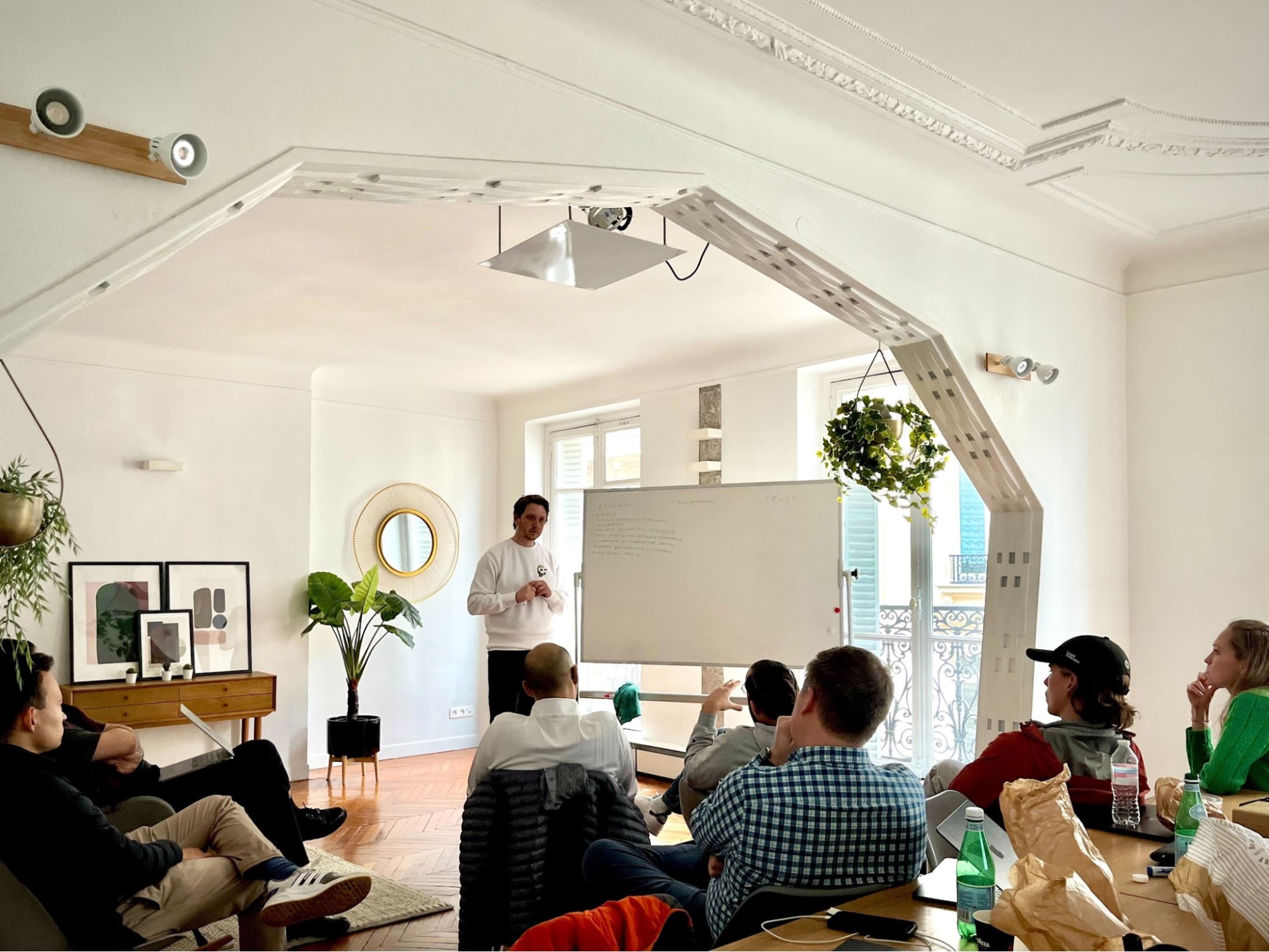
Why is branding important?
At its core, branding helps us understand the difference between similar things: sneakers, media companies, or even infrastructure-as-a-service providers. Branding connects a product or company’s story, purpose, quality, and community of people who support it with a name and idea that represents all of this and more to the rest of the world.
There’s nothing I love more professionally than building brands with great people and helping bring innovative ideas to life.
What is the biggest myth about working in startups?
This is a great question. There are a lot of myths. One of the biggest myths about working in a startup is that “if you build it, they will come.” That’s simply not true.
Founders need to focus on understanding their customers’ needs and defining a problem space, not just building for the sake of it. When they do find a good solution to a market need and can validate it, founders must be great storytellers to convince other people to care about what they’re doing and join them on the journey.
How do you think about leadership? What do you view as most important for effective leadership, particularly within the startup world?
I’m going to highlight a few ideas about leadership that are particularly relevant at an early-stage company and that I think are underappreciated:
- Lead by example as much as you can, and align what you do—not just what you say—with the company’s values, which should be clearly defined.
- Set the bar for excellence high. But also recognize when you need to take personal accountability for a decision or mistake. Team excellence requires leaders who take accountability.
- Surround yourself with experts. Be open and curious to learn from them.
- When there is a difference in perspective or approach, or something isn’t working, don’t take it personally. You want people to constructively challenge ideas and processes when they’re ineffective. Done well, this way of working benefits everyone.
- If you’re too involved in execution today, you won’t have the bandwidth to focus on hiring or changes to your model, where you need the company to go tomorrow, or the principles and the hard tradeoffs you’ll need to get there.
Most importantly, I think effective leadership is also about building up the credibility that enables you to hire the best people you can find, especially in competitive job markets. Effective leaders will also spend time mentoring everyone on the team and really figuring out what motivates the people they hire to do their best work.
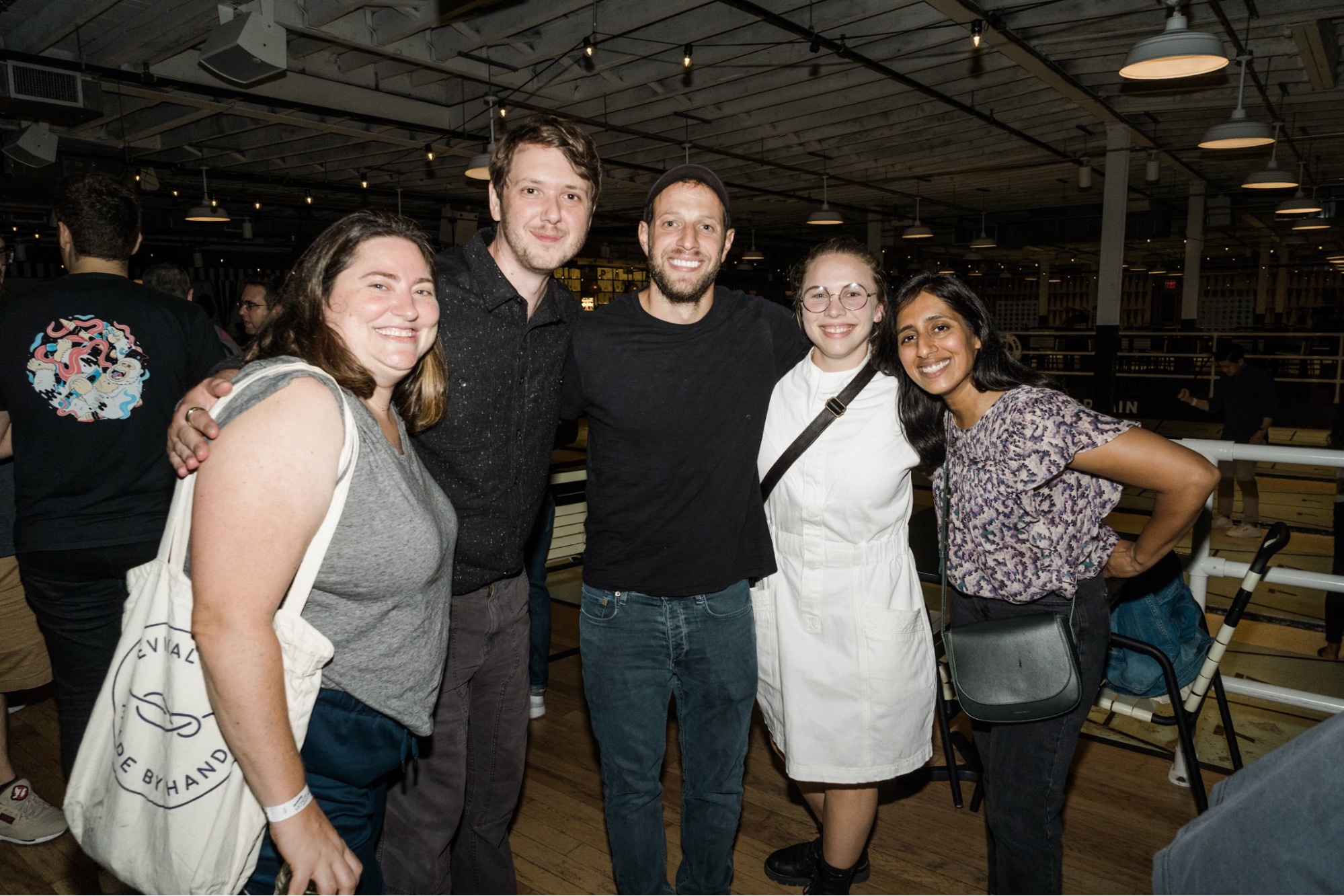
What inspires you, and keeps you motivated?
To sum up, here’s what inspires and motivates me: I love working with a lot of very smart people on a great team to address new challenges and opportunities. I love having an impact and working with amazing partners and contractors around the world, in an ever-evolving and highly competitive industry that is fundamentally only successful through collaboration.
The challenges, the people, and the opportunities for growth and experimentation all contribute to why I feel very fortunate and grateful to be in this position at Alluvial.
Outside of work, what brings you joy?
Cats, dogs, my family, travel, obscure dad puns, trying to get the top comment on TikTok videos, and having time to experiment with generative AI all bring me joy. I also like to record and release late night music.
Music has been a lifelong passion of mine and I am quite lucky to live at a time when technology makes it relatively easy to create anything imaginable.
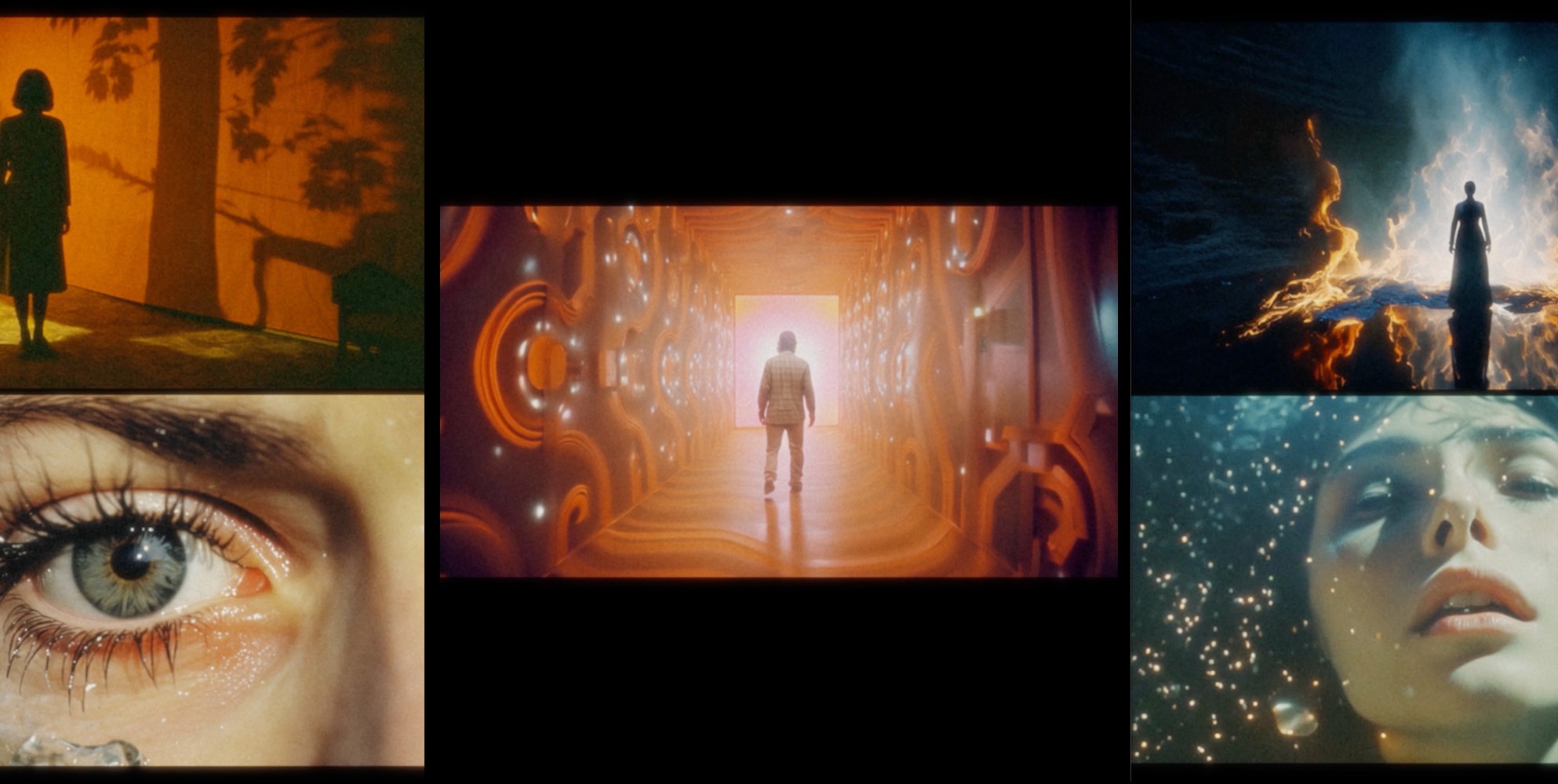
You get to redesign any brand in the world - which one do you choose and why?
I love this question! If I could collaborate with any team in the world on a rebrand, I’d choose CERN. Their mission to perform world-class research in fundamental physics to uncover what the universe is made of, and how it works, is beyond inspiring.
What could be better than experts working together to discover the previously unknowable and advance human knowledge and understanding of our existence?
Thanks for taking the time today, Mark! Anything else you’d like to share?
Thank you! Yes, there are two things I’d absolutely like to take the opportunity to shill here:
- We’re hiring for a lot of roles at Alluvial right now. If you enjoy collaborating with really great people around the world to make it easier for everyone to participate in staking, I believe this is the best place you can do that while learning from experts and advancing your career.
- There are also new items in the Liquid Collective apparel shop! Check them out here. If you made it this far in the interview, you deserve this $20 gift code to the shop: VJT6Z54J0G0T. Enter the code at checkout. I’d recommend getting the liquid steak.

P.S. Thank you Melissa, for these wonderful questions. I appreciate it! -Mark
Interview by Melissa Nelson
Please note
Liquid staking via the Liquid Collective protocol and using LsETH involves significant risks. You should not enter into any transactions or otherwise engage with the protocol or LsETH unless you fully understand such risks and have independently determined that such transactions are appropriate for you.
Any discussion of the risks contained herein should not be considered to be a disclosure of all risks or a complete discussion of the risks that are mentioned. The material contained herein is not and should not be construed as financial, legal, regulatory, tax, or accounting advice.